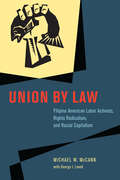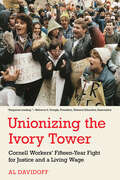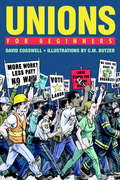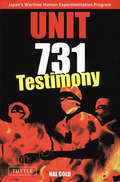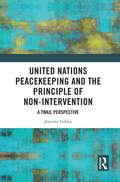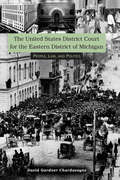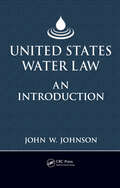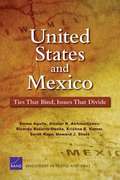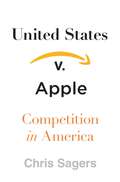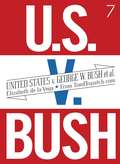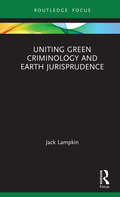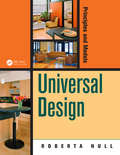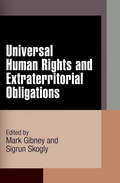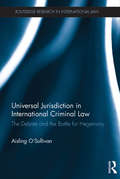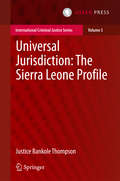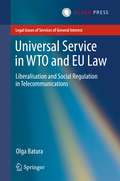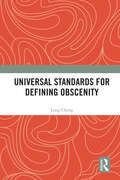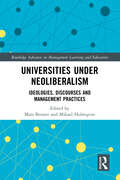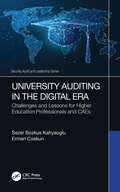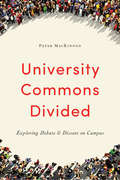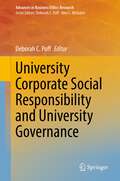- Table View
- List View
Union by Law: Filipino American Labor Activists, Rights Radicalism, and Racial Capitalism (Chicago Series in Law and Society)
by George I. Lovell Michael W. McCannLaborers in American West Coast agricultural fields and Alaska salmon canneries. There, they found themselves confined to exploitative low-wage jobs in racially segregated workplaces as well as subjected to vigilante violence and other forms of ethnic persecution. In time, though, Filipino workers formed political organizations and affiliated with labor unions to represent their interests and to advance their struggles for class, race, and gender-based social justice. Union by Law analyzes the broader social and legal history of Filipino American workers’ rights-based struggles, culminating in the devastating landmark Supreme Court ruling, Wards Cove Packing Co. v. Atonio (1989). Organized chronologically, the book begins with the US invasion of the Philippines and the imposition of colonial rule at the dawn of the twentieth century. The narrative then follows the migration of Filipino workers to the United States, where they mobilized for many decades within and against the injustices of American racial capitalist empire that the Wards Cove majority willfully ignored in rejecting their longstanding claims. This racial innocence in turn rationalized judicial reconstruction of official civil rights law in ways that significantly increased the obstacles for all workers seeking remedies for institutionalized racism and sexism. A reclamation of a long legacy of racial capitalist domination over Filipinos and other low-wage or unpaid migrant workers, Union by Law also tells a story of noble aspirational struggles for human rights over several generations and of the many ways that law was mobilized both to enforce and to challenge race, class, and gender hierarchy at work.
Unionizing the Ivory Tower: Cornell Workers' Fifteen-Year Fight for Justice and a Living Wage
by Al DavidoffUnionizing the Ivory Tower chronicles how a thousand low-paid custodians, cooks, and gardeners succeeded in organizing a union at Cornell University. Al Davidoff, the Cornell student leader who became a custodian and the union's first president, tells the extraordinary story of these ordinary workers with passion, sensitivity, and wit.His memoir reveals how they took on the dominant power in the community, built a strong organization, and waged multiple strikes and campaigns for livable wages and their dignity. Their strategies and tactics were creative and feisty, founded on worker participation and ownership.The union's commitment to fairness, equity, and economic justice also engaged these workers—mostly rural, white, and conservative—at the intersections of racism, sexism, classism, and homophobia. Davidoff's story demonstrates how a fighting union can activate today's working class to oppose antidemocratic and white supremacist forces.
Unions For Beginners
by David CogswellIt is a time when unions have returned to the front pages of newspapers and blogs and demonstrators are in the streets of America every day. It is a time when the right wing has tried to strike the final blow against what remains of the right to collective bargaining. It is a time when millions of members of the middle class are falling through the cracks in a downward economic trend that parallels the decline of unions. It is this time when people are turning again to the history of unions. Unions For Beginners provides an introduction to that essential history. Written and profusely illustrated in the user-friendly, accessible style of the For Beginners series, Unions For Beginners lays down a simple presentation of the colorful epic story of the struggle of working people to rise from lives dominated by toil and underpaid work to becoming full-fledged participants in the American dream they helped to build. Unions For Beginners presents the history of unions and the labor movement, the principles underlying union organizing, the decline of unions in the shadow of the rising corporate state, and the resurgence in the 21st century of union activism.
Unit 731
by Hal GoldThis is a riveting and disturbing account of the medical atrocities performed in Japan during WWII.In the first part of Unit 731: Testimony, author Hal Gold draws upon a painstakingly accumulated reservoir of sources to construct a portrait of the Imperial Japanese Army's most notorious medical unit, giving an overview of its history and detailing its most shocking activities. The second half of the book consists almost entirely of the words of former unit members themselves, taken from remarks they made at a traveling Unit 731 exhibition held around Japan in 1994-95.
Unit 731
by Hal GoldThis is a riveting and disturbing account of the medical atrocities performed in Japan during WWII.In the first part of Unit 731: Testimony, author Hal Gold draws upon a painstakingly accumulated reservoir of sources to construct a portrait of the Imperial Japanese Army's most notorious medical unit, giving an overview of its history and detailing its most shocking activities. The second half of the book consists almost entirely of the words of former unit members themselves, taken from remarks they made at a traveling Unit 731 exhibition held around Japan in 1994-95.
United Nations Peacekeeping and the Principle of Non-Intervention: A TWAIL Perspective
by Jennifer GiblinUsing a unique application of Third World Approaches to International Law (TWAIL), this book provides a critical, interdisciplinary, examination of the contemporary practice of UN peacekeeping.Is peacekeeping intervention? Since its conception in the mid-1950s, peacekeeping has significantly evolved from traditional, lightly armed, passive operations to robust, multi-dimensional stabilisation peacekeeping operations. This raises questions as to whether this is simply a natural evolution of peacekeeping or whether it marks an expansion of the concept beyond its boundaries, pushing it into the realm of peace enforcement or intervention. In response, this book examines the frameworks which govern UN peacekeeping and seeks to understand the relationship between peacekeeping and the principle of non-intervention. Providing practical examples from the United Nations’ operations in the Democratic Republic of the Congo and drawing upon interviews with key international actors including UN personnel, the book explores the boundaries of peacekeeping, contending that peacekeeping, at times, becomes a form of intervention. This, the book argues, is detrimental both to the concept of peacekeeping and to the host state, and it concludes by offering a series of recommendations to re-affirm peacekeeping’s boundaries and amplify the effectiveness of contemporary peacekeeping. This book will be of interest to scholars and students in international law, international relations, politics, history and criminology.
United States District Court for the Eastern District of Michigan: People, Law, and Politics
by David Gardner ChardavoyneA chronological history of the United States District Court for the Eastern District of Michigan, from its beginnings in the 1830s to the present.
United States Law (Student Text)
by Kristina SwannThe Student Text features four easy-to-read chapters that focus on the laws and court systems of the United States. Students will be able to describe the basic structure and functions of the judicial branch of the U.S. government and the U.S. Supreme Court; explain the difference between trial courts and courts of appeals; and describe the trial process and its participants.
United States Migrant Interdiction and the Detention of Refugees in Guantánamo Bay
by Azadeh DastyariThis book provides a thorough legal analysis of the United States Migrant Interdiction Program, examining the United States' compliance with its obligations under municipal and international law as it interdicts individuals at sea, conducts status determinations, and returns those interdicted to their home countries. This book also examines the rights of the small number of refugees and individuals at risk of torture detained in Guantánamo Bay, Cuba, awaiting resettlement in third countries. Policy-makers, students and scholars will benefit from this book's clarification of the legal obligations of nations engaged in extraterritorial status determination and detention, as well as its blueprint for compliance with international human rights and refugee law. As the first book of its kind devoted to the United States' interdiction program, this work represents an important contribution to scholarship in refugee law and policy, U.S. constitutional law, international maritime law, and international human rights law. Presents the only detailed contemporary legal analysis of the US Migrant Interdiction Program including refugee detainment at Guantánamo Bay, Cuba. Addresses an important and misunderstood feature of US immigration law. Clarifies the legal obligations of nations engaged in extraterritorial detention under international human rights and refugee law.
United States Water Law: An Introduction
by John W. JohnsonA Vital Explanation of Water Law and PolicyBecause demand for and access to quality water far exceeds the current supply, it is increasingly critical to understand the state and federal laws and policies that govern water rights. From farming, fishing, and biology to manufacturing, mine operation, and public water supply, water regulation affects a
United States and Mexico: Ties That Bind, Issues That Divide
by Howard J. Shatz Emma Aguila Alisher R. Akhmedjonov Ricardo Basurto-Davila Krishna B. Kumar Sarah KupsDespite geographical closeness and many shared economic interests, the United States and Mexico remain wary of one another. Policies designed to curtail the number of Mexican immigrants entering into the United States, a 700-mile-long border fence between the two countries, an increasing illegal drug trade, and continually troubled trucking legislation have somewhat eclipsed the North American Free Trade Agreement's (NAFTA's) cooperative scope. Additionally, the current international economic crisis has put any positive renegotiations between the United States and Mexico on hold. However, to ensure that the economic and political relationship between the two countries is as mutually beneficial as it is sustainable, it is critical that Mexico and the United States reiterate their commitment to their important relationship. This book focuses on how the alliance between the United States and Mexico can be made stronger, combining approaches from economics, demography, and sociology, discussions with U. S. and Mexican policymakers, reviews of published work, and results from opinion surveys. Whether relations between the two countries improve or deteriorate depends on the policies adopted by the current U. S. and Mexican administrations. New leaders in both countries are in a position to tackle common interests and take advantage of new opportunities without the baggage of past missteps and suspicions. --Publisher description.
United States v. Apple: Competition in America
by Chris SagersIn 2012, when the Justice Department sued Apple and five book publishers for price fixing, many observers sided with the defendants. It was a reminder that, in practice, Americans are ambivalent about competition. Chris Sagers shows why protecting price competition, even when it hurts some of us, is crucial if antitrust law is to preserve markets.
United States v. G. W. Bush et al.
by Elizabeth De La VegaWhat if there were a fraud worse than Enron and no one did anything about it?In United States v. George W. Bush et. al., former federal prosecutor Elizabeth de la Vega brings her twenty years of experience and her passion for justice to the most important case of her career. The defendants are George W Bush, Richard Cheney, Donald Rumsfeld, Condoleezza Rice, and Colin Powell. The crime is tricking the nation into war, or, in legal terms, conspiracy to defraud the United States.Ms. de la Vega has reviewed the evidence, researched the law, drafted an indictment, and in this lively, accessible book, presented it to a grand jury. If the indictment and grand jury are both hypothetical, the facts are tragically real: Over half of all Americans believe the president misled the country into a war that has left 2,500 hundred American soldiers and countless Iraqis dead. The cost is $350 billion -- and counting.The legal question is: Did the president and his team use the same techniques as those used by Enron's Ken Lay, Jeffrey Skilling, and fraudsters everywhere -- false pretenses, half-truths, deliberate omissions -- in order to deceive Congress and the American public?Take advantage of this rare opportunity to "sit" with the grand jurors as de la Vega presents a case of prewar fraud that should persuade any fair-minded person who loves this country as much as she so obviously does. Faced with an ongoing crime of such magnitude, she argues, we can not simply shrug our shoulders and walk away.
United States vs. the Cuban Five: A Judicial Coverup
by Rodolfo Dávalos FernándezTheir crime was keeping the government of Cuba informed of the activities of counter-revolutionary terrorist groups in Miami whose unbroken record of violent attacks on Cuba and supporters of the Cuban Revolution begins in the 1960s and continues to this day.
Uniting Green Criminology and Earth Jurisprudence
by Jack LampkinAs planet Earth continues to absorb unprecedented levels of anthropogenically induced environmental and climatic change, two similar academic schools of thought have emerged in recent years, both making sustained efforts to explain how and why this state of affairs has evolved. These two disciplines are known as green criminology and earth jurisprudence. Whilst these areas of study can be seen as sub-disciplines of their parent subjects, law and criminology, this book proposes that much can be achieved by authors uniting and collaborating on their academic work. By doing this, it is argued that green criminology stands to benefit from a discipline that places mother nature at the heart of lawmaking and therefore providing a solution to the environmental harms identified by green criminologists. Furthermore, earth jurisprudence will profit from utilising the breadth of academic work produced within the green criminology academic arena. Therefore, this book seeks to unite green criminology and earth jurisprudence in an effort to find solutions to the extraordinary environmental problems that the world now faces.
Universal Design: Principles and Models
by Roberta NullAs the baby boom generation ages, it is crucial that designers understand all they can about bringing this group, as well as all others, design that will offer function, aesthetics, and quality of life. Full of examples and illustrated with pictures of good design, Universal Design: Principles and Models details how the principles of universal desi
Universal Human Rights and Extraterritorial Obligations
by Mark Gibney Sigrun SkoglyGlobalization challenges fundamental principles governing international law, especially with respect to state sovereignty and international relations. This transformation has had a significant impact on the practice of trade law, financial regulation, and environmental law but relatively little effect on one area of law and regulation: human rights.Universal Human Rights and Extraterritorial Obligations examines both the international and domestic foundations of human rights law. What other contemporary human rights debates have almost totally ignored is that in an increasingly interdependent world--where public and private international actors have great influence on the lives of individuals everywhere--it is insufficient to assess only the record of domestic governments in human rights. It is equally important to assess the effect of actions taken by intergovernmental organizations, international private entities, and foreign states.From this standpoint, contributors to this book address how states' actions or omissions may affect the prospects of individuals in foreign states and asks important questions: To what extent do agricultural policies of rich countries influence the right to food in poorer countries? How do decisions to screen asylum seekers outside state borders affect refugee rights? How does cooperation among different states in the "war on terror" influence individuals' rights to be free from torture? This volume presents a brief for a more complex and updated approach to the protection of human rights worldwide.
Universal Jurisdiction in International Criminal Law: The Debate and the Battle for Hegemony (Routledge Research in International Law)
by Aisling O'SullivanWith the sensational arrest of former Chilean dictator Augusto Pinochet in 1998, the rise to prominence of universal jurisdiction over crimes against international law seemed to be assured. The arrest of Pinochet and the ensuing proceedings before the UK courts brought universal jurisdiction into the foreground of the "fight against impunity" and the principle was read as an important complementary mechanism for international justice –one that could offer justice to victims denied an avenue by the limited jurisdiction of international criminal tribunals. Yet by the time of the International Court of Justice’s Arrest Warrant judgment four years later, the picture looked much bleaker and the principle was being read as a potential tool for politically motivated trials. This book explores the debate over universal jurisdiction in international criminal law, aiming to unpack a practice in which international lawyers continue to disagree over the concept of universal jurisdiction. Using Martti Koskenniemi’s work as a foil, this book exposes the argumentative techniques in operation in national and international adjudication since the 1990s. Drawing on overarching patterns within the debate, Aisling O’Sullivan argues that it is bounded by a tension between contrasting political preferences or positions, labelled as moralist ("ending impunity") and formalist ("avoiding abuse") and she reads the debate as a movement of hegemonic and counter-hegemonic positions that struggle for hegemonic control. However, she draws out how these positions (moralist/formalist) merge into one another and this produces a tendency towards a "middle" position that continues to prefer a particular preference (moralist or formalist). Aisling O’Sullivan then traces the transformation towards this tendency that reflects an internal split among international lawyers between building a utopia ("court of humanity") and recognizing its impossibility of being realized.
Universal Jurisdiction: The Sierra Leone Profile
by Bankole ThompsonThe doctrine of universal jurisdiction has evolved throughout modern times in the context of global criminal justice as a paramount agent of combating impunity emanating from international criminality. Sierra Leone, as a member of the international community and the United Nations, has, in recent times, been a pioneer in the progressive application and development of international criminal law in the African region. Despite this role, the country's profile, both in terms of the incorporation and application of the doctrine of universal jurisdiction, is deficient in several major respects falling far short of its dual international obligation not to provide safe havens from justice for perpetrators of international crimes and to combat impunity from such criminogenic acts. Hence, a compelling reason for the author to write this book was to provide a seminal scholarly work on the subject articulating the existing state of the law in Sierra Leone and highlighting the deficiencies in the law and factors inhibiting the exercise of universal jurisdiction in this UN member state. It was also to propose necessary substantive and procedural law reforms in the state's jurisprudence on the subject. The book is recommended reading for practitioners and scholars in international criminal law and related disciplines. Its accessibility is highly enhanced by relevant tables and summaries of each chapter. Justice Rosolu J. B. Thompson is Professor Emeritus of Criminal Justice Studies, Eastern Kentucky University, USA. He was a member of and Presiding Judge in Trial Chamber I of the Special Court for Sierra Leone.
Universal Service in WTO and EU law
by Olga BaturaThis book is a systematic comparative study of WTO and EU law relevant for universal service provision, and a timely contribution to the ongoing scholarly and policy debates about the concept and scope of universal service. Universal service is one of the most significant regulatory issues worldwide and it is likely to remain so. The central question dealt with by the author is how the technologically intensive sector of telecommunications services can be regulated in a socially fair way in the light of liberalisation and the immense importance of ICTs in the Information Society. The author investigates whether the legal frameworks of WTO and EU can meet the challenges of the rapid and dramatic technological and social change and formulates relevant policy recommendations. The book is of interest to both scholars and practitioners in several disciplines, such as EU and WTO law, telecommunications law and regulation, political science regarding market regulation and governance as well as European integration and WTO. Olga Batura is affiliated to the Leuphana Law School, University of Lüneburg, Germany, and to the European Humanities University in Vilnius, Lithania.
Universal Standards for Defining Obscenity
by Long ChengIn the existing literature, there is no universal standard for defining obscenity. The book aims to demonstrate that there indeed exist underlying universal standards for defining obscenity (USDOs). However, their application to different contexts of time, place, and culture, may legitimately result in varied manifestations.The author examines a definition of obscenity proposed by the political and legal theorist Harry M. Clor, within John Finnis’ natural law theoretical framework. He also explores how positive law, including legislation, case law, and customary law, should respond to the proposed USDOs. The book addresses the theoretical foundation of the determination and regulation of obscenity, and it is supplemented with examples of legal practices from several jurisdictions, such as the United States, the United Kingdom, Canada, and Germany.The book will appeal to scholars of legal philosophy, natural law theories, obscenity law, and free speech.
Universities under Neoliberalism: Ideologies, Discourses and Management Practices (Routledge Advances in Management Learning and Education)
by Mats Benner Mikael HolmqvistThe COVID-19 pandemic, the surge of populism, the climate crisis and many other destabilizing factors in our time, all point at the expectation of trustworthy knowledge and reliable organization devoted to knowledge production and dissemination. However, universities remain enmeshed in economic liberalization and ensuing cultural struggles where their funding, governance and practices reflect market imprints – even academic ideals such as originality, or social ideals such as relevance have been transformed into measurable units and thereby risk losing their historical sway. This predicament is the focus of this book. The book explores the rise of neo-liberalization in academic system in a highly unlikely place: Sweden, a country with a strong social democratic tradition and a long history of state regulation of higher education. As an advanced welfare state with a powerful labour movement and a large public sector, market ideals and practices have been carefully curtailed historically. This notwithstanding, a neoliberal university model has evolved there, reshaping notions of academic identities, institutional directions and notions of quality. This edited collection will be of value to researchers, academics and students with an interest in organizational studies, governance, management, higher education, sociology and politics.
University Auditing in the Digital Era: Challenges and Lessons for Higher Education Professionals and CAEs (Security, Audit and Leadership Series)
by Sezer Bozkus Kahyaoglu Erman CoskunThis book explores how digital transformation is reshaping the manner in which higher education sectors emerge, work, and evolve and how auditors should respond to this challenging and risky digital audit universe in transforming the higher education system. It serves to help professionals to understand the reality of performing the Chief Audit Executive (CAE) role in today’s evolving business economy, specifically in the higher education sector. It compares and contrasts the stated IIA standards with the challenges and realities auditors may face and provides alternative scenarios to gaining a "seat at the table." This book also provides insight into critical lessons learned when executing the CAE role relevant for digitally transforming universities. The main purpose of this study is to rethink the audit culture in the digital era and reveal the key characteristics that are open for improvement so that digitally transforming universities can be audited according to the higher education standards with a digitally supported value-added audit approach. Based on this approach, the audit culture is reassessed considering the digital university conceptual framework and business model. There are two main points to consider for the digital university work environment: traceability and auditability. In this respect, policy recommendations are made for best practices to achieve value-added digital audits in transforming universities. The book has been written from both the reality and academic perspectives of two experienced authors. Sezer is a past CAE, CEO, and long-term senior internal auditor who has worked in the internal audit role for various listed companies, financial institutions, and government entities. Erman has extensive information technology and university accreditation knowledge in the global higher education sector. This brings a blend of value-added approaches to the readers and speaks to issues about understanding and dealing with audit culture and business evolution in digitally transforming organizations along with the requirements for upholding IIA standards. Geared toward the experienced or new CAE, University Auditing in the Digital Era: Challenges and Lessons for Higher Education Professionals and CAEs can be a tool for all auditors to understand some of the challenges, issues, and potential alternative solutions when executing the role of university auditing. In addition, it can be a valuable reference for university administrators and CIOs, as well as academics and all stakeholders related to the higher education sector.
University Commons Divided: Exploring Debate and Dissent on Campus
by Peter MacKinnonIn recent years, a number of controversies have emerged from inside Canadian universities. While some of these controversies reflect debates occurring at a broader societal level, others are unique to the culture of universities and the way in which they are governed. In University Commons Divided, Peter MacKinnon provides close readings of a range of recent incidents with a view to exploring new challenges within universities and the extent to which the idea of the university as ‘commons,’ a site for open and contentious disagreement, may be under threat. Among the incidents addressed in this book are the Jennifer Berdahl case in which a UBC professor alleged a violation of her academic freedom when she was phoned by the university's board chair to discuss her blog on which she speculated about the reasons for the university president's departure from office; the case of Root Gorelick, a Carleton University biologist and member of the university’s board of governors who refused to sign a code of conduct preventing public discussion of internal board discussions; the Facebook scandal at Dalhousie University’s Faculty of Dentistry in which male students posted misogynistic comments about their female classmates. These and many other examples of turmoil in universities across the country are used to reach new insights on the state of freedom of expression and academic governance in the contemporary university. Accessibly written and perceptively argued, University Commons Divided is a timely and bold examination of the pressures seeking to transform the culture and governance of universities.
University Corporate Social Responsibility and University Governance (Advances in Business Ethics Research #8)
by Deborah C. PoffThis book provides new and original research on the purpose and functions of universities from the perspective of corporate social responsibility. It addresses professional ethics questions that relate to universities as corporate citizens. Divided into two sections, the book starts out with an examination of the concept of universities. It explores the differences between historic and contemporary universities, the history and nature of university governance, the role of higher education, and the problem of domination and subjugation in a management context. The second section looks at the faculty, the students, and the role of spirituality in the university and research. It examines such themes as the nature of faculty and professors, faculty as change agents, diversity, inclusivity and incivility, academic integrity, citizenship of students, and ethical responsibility of researchers. The book calls on the expertise from both the fields of business and professional ethics and university management and leadership. It approaches the subject from an interdisciplinary perspective.
